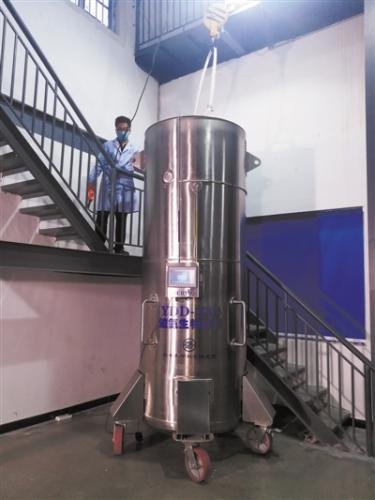
Zhan Wenlian's body is restored in a 2,000-liter container with liquid nitrogen. (Photo/Science and Technology Daily)
(ECNS) -- Following China's first case of cryogenically freezing a female patient's body after death, experts said it's "almost impossible" to revive a human body stored in liquid nitrogen with present technologies.
Zhan Wenlian, 49, died of lung cancer on May 8. Her body was injected with chemicals designed to protect her cells from damage during the freezing process and stored in a liquid nitrogen container less than five minutes after her heart stopped beating. The temperature in the container is below minus 190 degrees Celsius. Zhan's husband Du Junmin said it was done in the hope of bringing her back to life in future when medical technologies are able to cure her.
The procedure was conducted by Alcor Life Extension Foundation and Qilu Hospital of Shandong University. Du hopes his wife can wake someday, adding he would also like to take the procedure after death.
Alcor Life Extension Foundation was founded by Yinfeng Biological Group, a private company based in Jinan, Shandong Province, which specializes in research and development of human cell and organ storage technologies.
Liu Jing, an expert with the Technical Institute of Physics and Chemistry at Chinese Academy of Sciences in Beijing, who specializes in low temperature biomedical engineering, told The Paper present technology is only responsible for "freezing the body", but not for "reviving it."
Freezing the human body is the ultimate objective of cryomedicine, Liu said. The cryogenic technique is a "double-edged sword", which can protect a living body and destroy it as well, he added.
The development of emerging technologies may revive a frozen body in future, but so far it can only successfully preserve cells such as fibroblast, adipocyte, tumor cells, stem cells, sperm and oocyte.
The revival of frozen cells is difficult, Liu said, noting that less than 50 percent of frozen oocyte can be revived. The size of cells may be one of the factors that influence the result.
Zhu Zuoyan, an academician at the Chinese Academy of Sciences, also said there were no successful precedents of reviving frozen animals, including fish and fruit flies, in previous experiments.
Liu said the cooling liquid may also damage cells during the freezing and thawing processes, but the procedure conducted by Yinfeng Biological Group could be a positive trial.
Optimistically speaking, with the emergence of new technologies, it's not impossible to find a breakthrough in current technical problems to realize revival and survival after extremely arduous and innovative exploration, Liu said.


















































